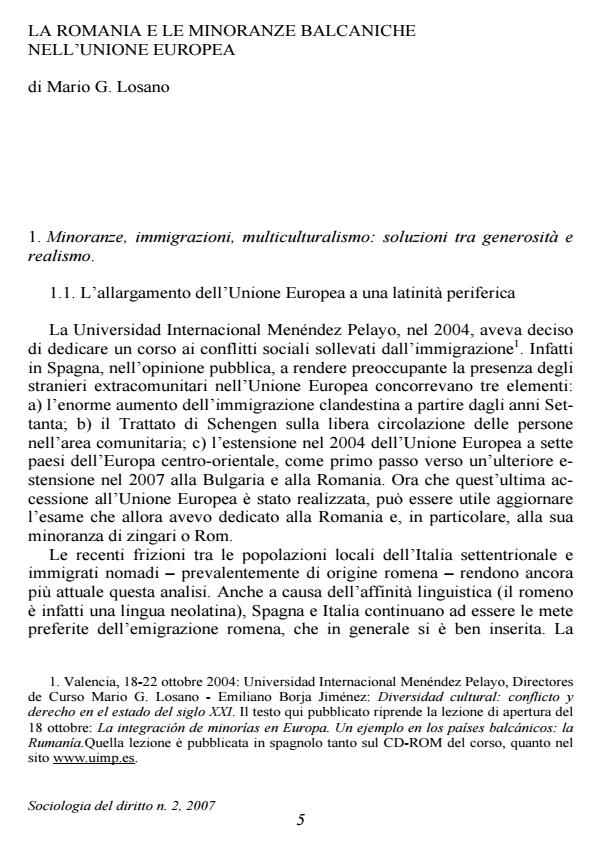La Romania e le minoranze balcaniche nell'Unione europea
Journal title SOCIOLOGIA DEL DIRITTO
Author/s Mario G. Losano
Publishing Year 2007 Issue 2007/2
Language Italian Pages 35 P. 5-39 File size 230 KB
DOI
DOI is like a bar code for intellectual property: to have more infomation
click here
Below, you can see the article first page
If you want to buy this article in PDF format, you can do it, following the instructions to buy download credits

FrancoAngeli is member of Publishers International Linking Association, Inc (PILA), a not-for-profit association which run the CrossRef service enabling links to and from online scholarly content.
Romania and the Balkan Minorities in the European Union ABSTRACT: When Romania and Bulgaria joined the European Union on 1 January 2007, the event obliged a comprehensive reappraisal to be made of certain problems that had only been tackled piecemeal in previous years. This article is divided into two parts and is restricted to examining the main problems related to Romania, extending some analyses to apply to the minorities in the entire Balkan area. In numerous cases, the author was able to access original Romanian documents. The first part of the article defines certain general concepts to be used later on: what is meant by intra-community immigration and by minority. It then provides data about the history of Romania, the formation of its minorities and two problem-prone results of the state’s recent territorial evolution, i.e. the formation of the Republic of Moldova and of the unrecognised state of Transdniestria. The fact is that their proximity to the trouble spots in the Caucasus and, therefore, to Islam, and the permeability of their borders constitute an open sore for the European Union. The second part examines the connection between minorities and migratory trends in present-day Romania: in particular, the Hungarian minority (the source of decades of friction with Hungary) and the Rom minority (also a source of problems inside Romania and pushed to emigrate by the increasing degree of domestic insecurity). Romania is trying to shield the Rom against this insecurity by using police measures (examined here in detail) and a schooling policy that also takes the linguistic requirements of its numerous minorities into account. The last two paragraphs are then dedicated to Romanian migration towards the other member states of the European Union and, in particular, to the legal problems that have arisen in Italy in the transition phase: there are many Romanians who made their way into Italy as illegal immigrants and, as such, are now subject to criminal proceedings; yet in the meantime they have become European Union citizens, so some judges are questioning whether they can still be prosecuted for the crime of illegal immigration.
Mario G. Losano, La Romania e le minoranze balcaniche nell'Unione europea in "SOCIOLOGIA DEL DIRITTO " 2/2007, pp 5-39, DOI: